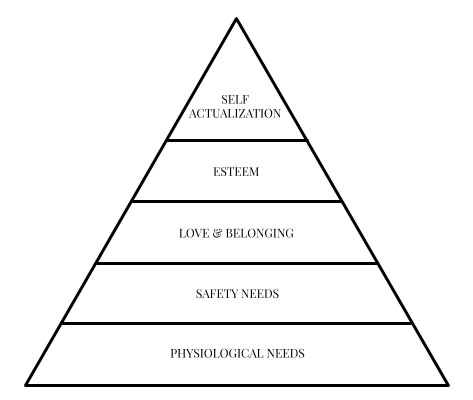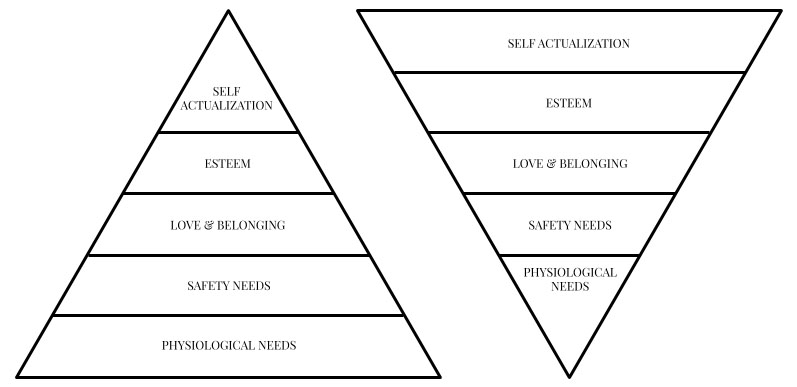The Maslow’s hierarchy of needs has been mostly used in psychology to understand the underlying forces that drive human motivation. It goes from physiological needs at the base of the pyramid, to safety, love and belonging, social needs, esteem, and ends with self-actualisation at the top of the pyramid. These are supposed to represent the levels of personal growth in humans. I always found it interesting how this hierarchy can also be used to predict economic trends.

In his book Abundance, engineer, physician, and entrepreneur Peter Diamandis makes the case for a future where the global economy is providing opportunity to billions of people who’ve never had it, conquering poverty, and addressing the basic needs of humanity. Of course, most of us will still have to work, and poverty will not instantly go away, but in the future we will spend a smaller fraction of our time and money on fulfilling our basic needs. Which begs the question: in a world where the basic needs of most people are met with less work, what will we spend our extra time and money on?
The answer is self-actualisation. The Maslow’s hierarchy of needs will be turned upside down, with most of our energy, time, and money spent on improving ourselves. And I believe there will be many opportunities for makers who decide to meet this growing demand.

7 trends emerging from the self-actualisation economy
Self-actualisation will become so central to our lives that it’s impossible to predict exactly what new trends will emerge in the next few years. A few companies have already made a bet on our craving for betterment. For example, Etsy empowers people to be their most creative selves, Headspace helps them become their most mindful selves, and fitness brands such as Nike are all about self-improvement and making the most of your body.
These brands all have a life-affirming approach, defining themselves as companions for personal growth, and positioning their products as designed for smart, resilient, passionate, original, and forward-thinking people. What they offer customers is the promise to help them be all they can be.
But not just brands will be impacted by the advent of the self-actualisation economy. It will be so pervasive that it will shape most areas of our lives. Here are just a few industries I think will flourish under the self-actualisation economy:
- Everyone will have at least one coach. I had a conversation yesterday with Tyler Tringas of Earnest Capital about a post from Tiago Forte, who currently has eight coaches for various aspects of his life and his work, such as a personal trainer or a marketing coach. In the future, having a coach will be seen as a basic investment in one’s personal growth. Great coaches will be sought-after and people will be paying based on value, not on price.
- Remote learning will become the norm. We’re already seeing a shift to remote learning from many leading universities, and online learning platforms such as Udemy and Udacity are thriving businesses. For knowledge workers, keeping up with ever-changing required skills will be essential to their career, and remote learning will allow them to stay up-to-date without sacrificing their work-life balance.
- Everyone will become a teacher. As a result of the first two trends, everyone will become a coach or teacher of some sort. It will become easier to learn and practice a new craft, and to teach it to other people. Flexible and lucrative, teaching other people will become more popular as a career path.
- Soft skills will make a comeback. I already wrote about the importance of soft skills, and I think the self-actualisation economy will make these even more crucial. Skills such as creativity, persuasion, collaboration, adaptability and time management will be valued as much if not more than hard skills by employers.
- New types of schools will emerge. They will focus on topics that are currently left out in the traditional curriculum. Not only soft skills, but mindfulness, applied psychology, personal finance, and more. These will emerge from the plethora of online courses currently available online and turn into fully fledged schools catering to specific audiences. There will be schools for founders, schools for coaches, schools for e-commerce business owners, schools for digital marketers. These schools will not be about the credentials people will obtain through them, but focused on acquiring immediately applicable skills for people to thrive at the intersection of their business and their passion.
- Retreats will replace traditional vacations. People will become more purposeful with their time, and will want to invest their holiday breaks into improving themselves. Retreats that focus on developing a particular skill or being introduced to a new topic in a fixed amount of time will become popular options: meditation, yoga, writing retreats, etc. It won’t be only about coming back with pretty photos or interesting stories anymore, it will be about mastering new skills for life.
- New research will focus on learning. With products such as Neuralink in the making, it’s hard to imagine what the future of learning will look like. But as consumers will keep on looking on ways to expand their minds, do more, and learn more efficiently, companies and academic institutions will invest more in research at the intersection of neuroscience and technology with the specific objective of improving the way we transmit, acquire, and use knowledge.
Each of these trends offer many opportunities for entrepreneurs who care about betterment, whether as a teacher or as a learner. Many of these trends are intertwined and will give rise to new products, new services, and new industries. I’m excited to see how new technology such as AI and VR/AR are also going to be used to help people live more fulfilling lives.
